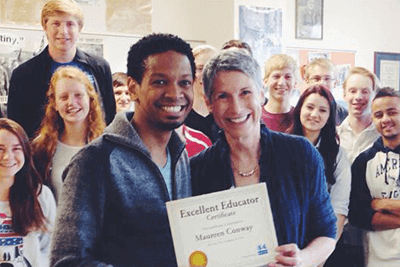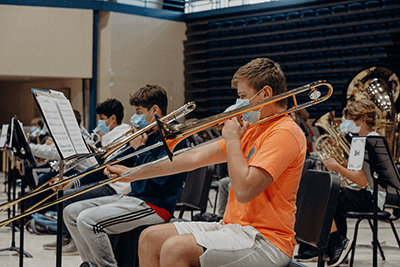February 24, 2022
 from Dr. Bill Hudson, Head of School
from Dr. Bill Hudson, Head of School
While walking the indoor track in the Lansing Sports Center last Friday, I took note of a large wooden structure assembled on Court Four. I had a hunch that it was a model constructed by our students on the FIRST Robotics team. If you are not familiar with FIRST Robotics, it is an international organization that combines “the excitement of sport with the rigors of science and technology.” I’ve been to several competitions, and I have to agree. According to FIRST Robotics, “teams of students are challenged to raise funds, design a team ‘brand,’ hone teamwork skills, and build and program industrial-size robots to play a difficult field game against like-minded competitors. It’s as close to real-world engineering as a student can get.”
FIRST Robotics is a terrific example of inquiry and problem-based activities that align with our MPA science philosophy of fostering creative, inquisitive, and critical thinkers. The science department is firmly rooted in the idea of the “citizen scientist,” a term that encompasses scientific research, concepts, and principles and public engagement in order to expand the reach, relevance, and impact of science to the whole of society in service of the common good. It is true that a number of MPA graduates go on to become doctors and scientists. It is also true that when they chose other fields of studies or careers, MPA graduates carry with them the knowledge and experience of how science impacts our world.
What is unique about the MPA science philosophy and curriculum is the emphasis on engaging students in the application of scientific method, principles, and research to real-world problems and nurturing important competencies and skills. Taking an inquiry-based approach, students working individually or collaboratively come to understand how content is useful and can be applied to everyday problems, both large and small. The following are only a few examples of our distinctive approach in action. Read More
 from Dr. Jenn Milam, Middle School Director
from Dr. Jenn Milam, Middle School Director Position while at MPA
Position while at MPA Due to the weather, all afterschool activities including games, practices, and meetings are cancelled this afternoon, Tuesday, February 22. School will remain in session until our regular dismissal time at 3 PM.
Due to the weather, all afterschool activities including games, practices, and meetings are cancelled this afternoon, Tuesday, February 22. School will remain in session until our regular dismissal time at 3 PM. Friday, April 22, 2022
Friday, April 22, 2022 from Dr. Bill Hudson, Head of School
from Dr. Bill Hudson, Head of School from Dr. Bill Hudson, Head of School
from Dr. Bill Hudson, Head of School
 Thank You!
Thank You! from Dr. Bill Hudson, Head of School
from Dr. Bill Hudson, Head of School